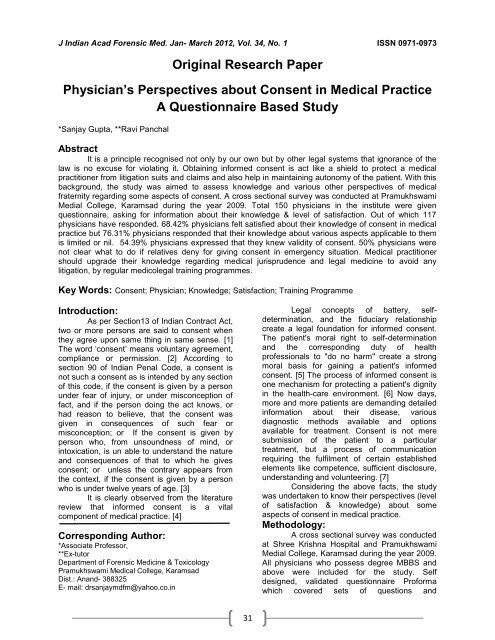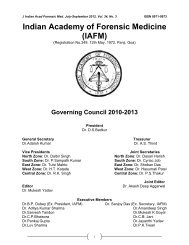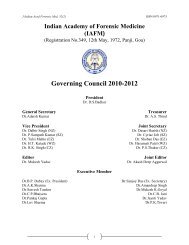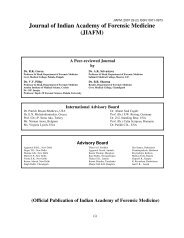Indian Academy of Forensic Medicine (IAFM) - Official website of IAFM
Indian Academy of Forensic Medicine (IAFM) - Official website of IAFM
Indian Academy of Forensic Medicine (IAFM) - Official website of IAFM
You also want an ePaper? Increase the reach of your titles
YUMPU automatically turns print PDFs into web optimized ePapers that Google loves.
J <strong>Indian</strong> Acad <strong>Forensic</strong> Med. Jan- March 2012, Vol. 34, No. 1 ISSN 0971-0973<br />
Original Research Paper<br />
Physician’s Perspectives about Consent in Medical Practice<br />
A Questionnaire Based Study<br />
*Sanjay Gupta, **Ravi Panchal<br />
Abstract<br />
It is a principle recognised not only by our own but by other legal systems that ignorance <strong>of</strong> the<br />
law is no excuse for violating it. Obtaining informed consent is act like a shield to protect a medical<br />
practitioner from litigation suits and claims and also help in maintaining autonomy <strong>of</strong> the patient. With this<br />
background, the study was aimed to assess knowledge and various other perspectives <strong>of</strong> medical<br />
fraternity regarding some aspects <strong>of</strong> consent. A cross sectional survey was conducted at Pramukhswami<br />
Medial College, Karamsad during the year 2009. Total 150 physicians in the institute were given<br />
questionnaire, asking for information about their knowledge & level <strong>of</strong> satisfaction. Out <strong>of</strong> which 117<br />
physicians have responded. 68.42% physicians felt satisfied about their knowledge <strong>of</strong> consent in medical<br />
practice but 76.31% physicians responded that their knowledge about various aspects applicable to them<br />
is limited or nil. 54.39% physicians expressed that they knew validity <strong>of</strong> consent. 50% physicians were<br />
not clear what to do if relatives deny for giving consent in emergency situation. Medical practitioner<br />
should upgrade their knowledge regarding medical jurisprudence and legal medicine to avoid any<br />
litigation, by regular medicolegal training programmes.<br />
Key Words: Consent; Physician; Knowledge; Satisfaction; Training Programme<br />
Introduction:<br />
As per Section13 <strong>of</strong> <strong>Indian</strong> Contract Act,<br />
two or more persons are said to consent when<br />
they agree upon same thing in same sense. [1]<br />
The word ‘consent’ means voluntary agreement,<br />
compliance or permission. [2] According to<br />
section 90 <strong>of</strong> <strong>Indian</strong> Penal Code, a consent is<br />
not such a consent as is intended by any section<br />
<strong>of</strong> this code, if the consent is given by a person<br />
under fear <strong>of</strong> injury, or under misconception <strong>of</strong><br />
fact, and if the person doing the act knows, or<br />
had reason to believe, that the consent was<br />
given in consequences <strong>of</strong> such fear or<br />
misconception; or If the consent is given by<br />
person who, from unsoundness <strong>of</strong> mind, or<br />
intoxication, is un able to understand the nature<br />
and consequences <strong>of</strong> that to which he gives<br />
consent; or unless the contrary appears from<br />
the context, if the consent is given by a person<br />
who is under twelve years <strong>of</strong> age. [3]<br />
It is clearly observed from the literature<br />
review that informed consent is a vital<br />
component <strong>of</strong> medical practice. [4]<br />
Corresponding Author:<br />
*Associate Pr<strong>of</strong>essor,<br />
**Ex-tutor<br />
Department <strong>of</strong> <strong>Forensic</strong> <strong>Medicine</strong> & Toxicology<br />
Pramukhswami Medical College, Karamsad<br />
Dist.: Anand- 388325<br />
E- mail: drsanjaymdfm@yahoo.co.in<br />
31<br />
Legal concepts <strong>of</strong> battery, selfdetermination,<br />
and the fiduciary relationship<br />
create a legal foundation for informed consent.<br />
The patient's moral right to self-determination<br />
and the corresponding duty <strong>of</strong> health<br />
pr<strong>of</strong>essionals to "do no harm" create a strong<br />
moral basis for gaining a patient's informed<br />
consent. [5] The process <strong>of</strong> informed consent is<br />
one mechanism for protecting a patient's dignity<br />
in the health-care environment. [6] Now days,<br />
more and more patients are demanding detailed<br />
information about their disease, various<br />
diagnostic methods available and options<br />
available for treatment. Consent is not mere<br />
submission <strong>of</strong> the patient to a particular<br />
treatment, but a process <strong>of</strong> communication<br />
requiring the fulfilment <strong>of</strong> certain established<br />
elements like competence, sufficient disclosure,<br />
understanding and volunteering. [7]<br />
Considering the above facts, the study<br />
was undertaken to know their perspectives (level<br />
<strong>of</strong> satisfaction & knowledge) about some<br />
aspects <strong>of</strong> consent in medical practice.<br />
Methodology:<br />
A cross sectional survey was conducted<br />
at Shree Krishna Hospital and Pramukhswami<br />
Medial College, Karamsad during the year 2009.<br />
All physicians who possess degree MBBS and<br />
above were included for the study. Self<br />
designed, validated questionnaire Pr<strong>of</strong>orma<br />
which covered sets <strong>of</strong> questions and









